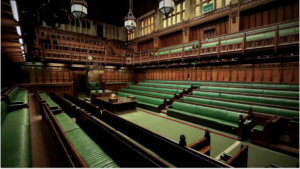As the UK prepares for a general election, Harbingers Magazine explains all the important information.

January 31, 2024, London, United Kingdom. The leader of the opposition, sir Keir Starmer (L), and Prime Minister Rishi Sunak during the PMQ session in the House of Commons
February 2, 2024
What is ‘first-past-the-post’, and how does one command a majority? UK General Election explained
What is a general election for?
In a general election, voters select a representative for their local district, also known as a constituency, in Parliament. A total of 650 lawmakers, each representing a district, will be elected to serve in the House of Commons, one of two chambers of Parliament, which decides the country’s laws and policies.
Any British citizen, as well as citizens of the Commonwealth or Ireland, who are 18 years or older and reside in Britain, are eligible to register for voting.
When is the next general election expected?
General elections in the UK lack a fixed date – they must occur within a maximum interval of five years, but the timing can otherwise be determined by the Prime Minister.
In early January, the UK Prime Minister Rishi Sunak said he expects to call the next general election “in the second half” of 2024.
The current Parliament must be dissolved by its fifth anniversary on December 17, 2024, allowing 25 extra working days for election preparations. Thus, the latest possible date for the next general election is January 28, 2025.
How is an election called?
To call a general election, the Prime Minister is required to ask the Monarch, currently King Charles III, to formally “dissolve” the Parliament. The King has the discretion to either accept or reject the request – rejection, however, has never happened as the monarch is obliged not to interfere with political affairs.
If the request is accepted, then a polling day will appear 25 working days later.
Once the Parliament’s dissolution starts, the Prime Minister loses their status and has to campaign for re-election. During this time the government also enters a pre-election period, also known as ‘purdah’ or a period of ‘heightened sensitivity’, which advises against conducting any activity relating to ministerial and departmental works during the campaign.
How does the voting system work?
General elections in Britain operate on a first-past-the-post basis. This means that the political candidate that receives the most votes in each constituency secures a seat in Parliament.
On election day, voters are presented with a ballot paper featuring a list of candidates. Since there is only one MP representing each constituency, each party has to put forward only one candidate.
Voters mark a cross next to their preferred candidate. This is where ‘tactical voting’ enters the stage – if they think their preferred candidate has a low chance of winning, they may choose to vote for a candidate they like less, but that has a better chance of winning against the candidate they do not want to take the seat.
Since there is only one candidate from each party, voters who support a particular party but do not like their candidate will have to choose between voting for a party they do not support or a candidate they do not like.
Voting takes place between 07:00 and 22:00 at local polling stations, mostly set up in schools, town and village halls etc.
Who is elected?
If a party secures over half the parliamentary seats (known as the ‘majority’, with more than 325 seats), then the current King will invite this party’s leader to form a government, and its leader will become the prime minister.
If no party gets the most votes, they might team up to make a coalition government. In this setup, smaller parties could take on some ministerial roles. Or, the biggest party might lead as a minority government, getting informal backing from other MPs.
View this post on Instagram
While the Conservative and Labour parties are Britain’s largest, several smaller parties are running candidates.
However, the latest polls indicate that the Labour Party is ahead by over 20 percentage points (46%) compared to the governing Conservatives (22%). Projections also suggest a significant majority for Labour if this level of support holds in an election.
What is Voter ID?
The upcoming election will be the first general election where voter ID will be required, meaning that for the first time, every voter must bring valid photo ID in order to cast a ballot.
Voter ID was trialled in the May 2022 local elections and a preliminary analysis of the impact by the Electoral Commission found that about 14,000 people were unable to vote. This was about 0.25% of voters, but the impact was greater for lower income and minority voters.
What is the youth’s attitude towards elections?
Historically, youth participation in democracy has been low in England. Since the 1970s, 18-24 year-olds have had the lowest turnout in every election, with just under 50% of them voting in the last general election in 2019.
There are a number of reasons for that. Young people’s low voting turnout mostly stems from busy lives during the critical 18-24 age range. Juggling education and career beginnings leaves little time for political engagement. Additionally, limited political education in schools contributes to their lack of knowledge about Westminster operations.
New evidence suggests that reducing the voting age in England may rekindle interest in politics amongst young people and promote longer term participation in elections.





